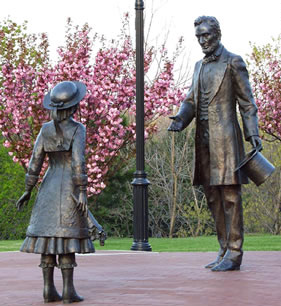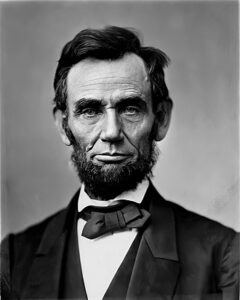 Today million and millions of dollars are spent on presidential campaigns. Bombarded by ads on television, in mailers and phone calls, it’s a dirty, relentless fight. By election day everyone is so ready for it all to be over.
Today million and millions of dollars are spent on presidential campaigns. Bombarded by ads on television, in mailers and phone calls, it’s a dirty, relentless fight. By election day everyone is so ready for it all to be over.
Abraham Lincoln had a way with words. “He can compress the most words into the smallest idea of any man I know,” he said. While he said it of more than one person, you can be sure that if he were alive today that quote could be directed to any number of politicians currently running for office.
Campaigning was very different in Lincoln’s day. Lincoln learned of his successful nomination as the Republican candidate from the wireless in his hometown of Springfield, Illinois. “Gentlemen, he grinned, “you had better come up and shake my hand while you can—honors elevate some men.”
Imagine this: in Lincoln’s day it was considered unseemly and inappropriate—beneath one’s dignity—to campaign for oneself. Debates by the candidates were allowed, but campaigning was left to loyal supporters to speak on their behalf. Newspapers openly slanted news coverage. Campaign songs filled the air at rallies, parades and the debates.
Lincoln honored the tradition of not personally campaigning, as did most of his opponents. Only the Democratic candidate, Steven Douglas, broke rank and campaigned across the country. It was a bitter and ugly campaign. Presidential candidate John Bell’s supporters rang bells to disrupt my rallies. “Look at his face! Would you elect a gorilla?” detractors jeered. Others insisted that Lincoln would enforce a policy of marriage between the races and that within ten years all of the whites would be slaves owned by Negroes.
November 6, 1860, Lincoln awaited the returns at home. “It was a sleepless night, for I then felt, as I never had before, the responsibility that might be upon me,” he wrote. Three months later, just fifty-one years old and full of hope and trepidation, Lincoln boarded a train to Washington and the presidency. The townspeople of Springfield, gathering to say goodbye on that cold and overcast day, saw a man so filled with emotion that he could not command a steady voice. Springfield was his home, and he wondered how, or whether, he would return. “I hope you, my friends, will all pray that I may receive that Divine assistance without which I cannot succeed, but with which success is certain. I bid you an affectionate farewell.”
Of course many things turned the election toward Lincoln. But history has largely forgotten the role of one little girl, Grace Bedell. Just twelve years old, she took it upon herself to write to Lincoln while he was still a candidate. In it she told him that her family would vote for him only if he would grow whiskers because, as she said, “You would look a great deal better for your face is so thin.”
On his way to Washington, Lincoln made sure to meet young Grace Bedell during one of his stops. As he had taken her advice, he wanted to thank her. So the two of them sat together on the edge of the platform. “Look at my whiskers, I have been growing them for you,” he said, and gave her a big kiss.
If it were not for Gracie Bedell, would history be as we know it? One can only wonder. I welcome your comments.
For a well-researched introduction to Lincoln, including the role faith played in his life, see his profile in my book, Eternity through the Rearview Mirror.


